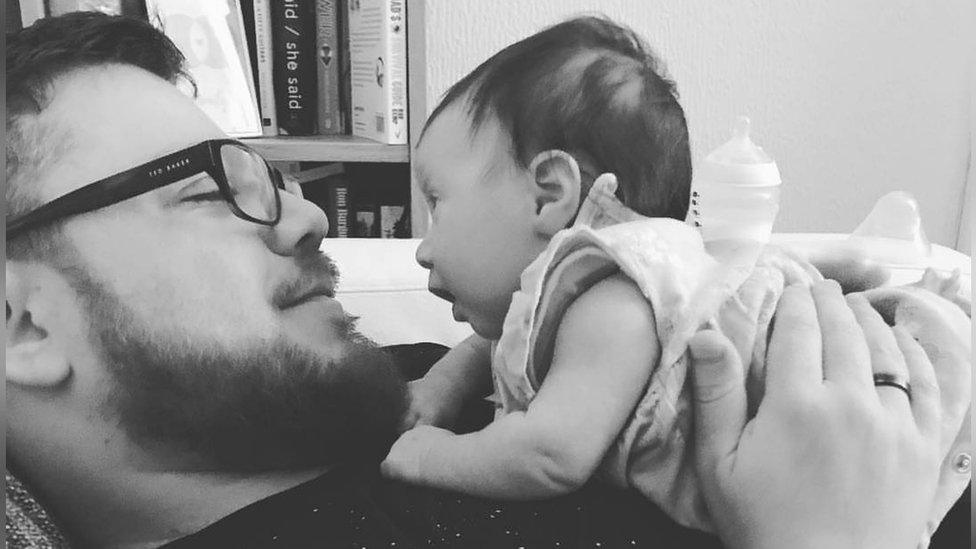Maternity rights bill could make things worse, campaigner says
- Published

Jodie Brearley says the new law could make things "worse" for women
A bill which aims to protect women's jobs when they return to work after giving birth will have little impact, a pregnancy rights campaigner says.
Politicians want to extend legal protection for women after learning one in nine mothers in Britain was fired or made redundant when going back to work.
But campaigner Joeli Brearley says the new rule could work against women.
"It could actually make some forms of discrimination worse if employers feel it's onerous to hire women," she said.
The bill had an initial reading in the Commons on Tuesday and will have its second reading on Wednesday.
'Minimal difference'
Conservative MP Maria Miller, who chairs the Women and Equalities Committee, has introduced the bill, urging the introduction of legislation to protect women from being made redundant during pregnancy and maternity leave, and for six months after returning to work.

Maria Miller chairs the Women and Equalities Committee
Ms Brearley, founder of campaign group Pregnant Then Screwed, said: "I do believe Maria Miller's bill will help, but the difference it will make is minimal.
"Fewer than 1% of women who experience pregnancy or maternity discrimination even raise a tribunal claim, so if women can't use the law to protect themselves there's little point in enhancing it.
"So alongside bills like this we would also like to see legislation that gives women greater access to justice.
"What we want to see from the government is not them pushing the problem back on to business, which is what this bill is doing, it's saying employers, 'you deal with this problem'.
"We know that a third of employers avoid hiring women of childbearing age, so if we make it more onerous for companies to hire women, that will play out in the recruitment process. Discrimination will occur before women are even employed and this is an enormous contributor to the gender pay gap."
The latest data on the issue is from a 2016 report commissioned by the government and the Equality and Human Rights Commission,, external in which more than 3,000 employers and 3,000 mothers in Britain took part.
It showed that:
One in nine mothers (11%) felt forced to leave their job - scaled up to the general population, that could mean as many as 54,000 women annually
The figure is 4% up on a a similar report a decade earlier
Three in four mothers (77%) said they had a negative or possibly discriminatory experience during pregnancy, maternity leave, and/or on return from maternity leave
Only 3% of mothers took their case to tribunal
'Absolutely devastated'
Claire Heptonstall, from Leeds, who worked in the beauty and hairdressing industry, was made redundant while on maternity leave.
"I was just absolutely devastated," she said.
"I was hurt by it because I just didn't understand why I didn't have a job to go back to, because I'd been there for so long."
"I felt worthless. I felt like I wasn't appreciated. I'd worked six days a week doing eight or nine hours for them, I'd go in early, I'd work late, I'd work from home for them, and then for them to just dismiss me like I was just a number - I'm not a number, I'm a person and I have feelings and I was just so upset in what they did."

Claire Heptonstall lost her job while she was on maternity leave
Claire said she was "mentally stressing" over the situation and worrying about how to pay the bills and look after her baby.
In the end, she took her employers to a tribunal and won, but said: "It [the tribunal] was the most daunting thing I've ever had to do. You actually feel like you're on trial. It's the scariest thing, I felt sick, I was shaking, I got really ill by it all.
"I'm a single mum, so bringing up a child by yourself is quite hard but then you have that pressure on top. You just feel so alone and you really don't know what to do."
Employment lawyer Yunus Lunat, who represented Claire, says that pregnancy discrimination is happening "on an industrial scale" and that 99% of cases are covered by non-disclosure agreements (NDA).
These prevent staff and former staff making information public, and if somebody breaks an NDA, they could end up being sued.
"Employers feel they can get away with it, because the employee is offered a sum of money, nowhere near what should be adequate to compensate, but offered a sum as an inducement to leave," he told the BBC.
"Perhaps if someone is having a difficult pregnancy, uncertainties about the future - do they really want all this uncertainty about going to tribunal not knowing what the outcome will be?
"Nine out of 10 women in that situation will just sign the agreement and move on."
- Published21 May 2019

- Published30 January 2019

- Published24 January 2019

- Published5 December 2018

- Published29 November 2018
